Career Stories
Updated 22 December 2021
Analysis in government and the role of analysts offers a huge variety of experience and opportunities to make an impact.
Meet some of our members to find out about their career journeys.
Alec Waterhouse (Business Energy and Industrial Strategy)
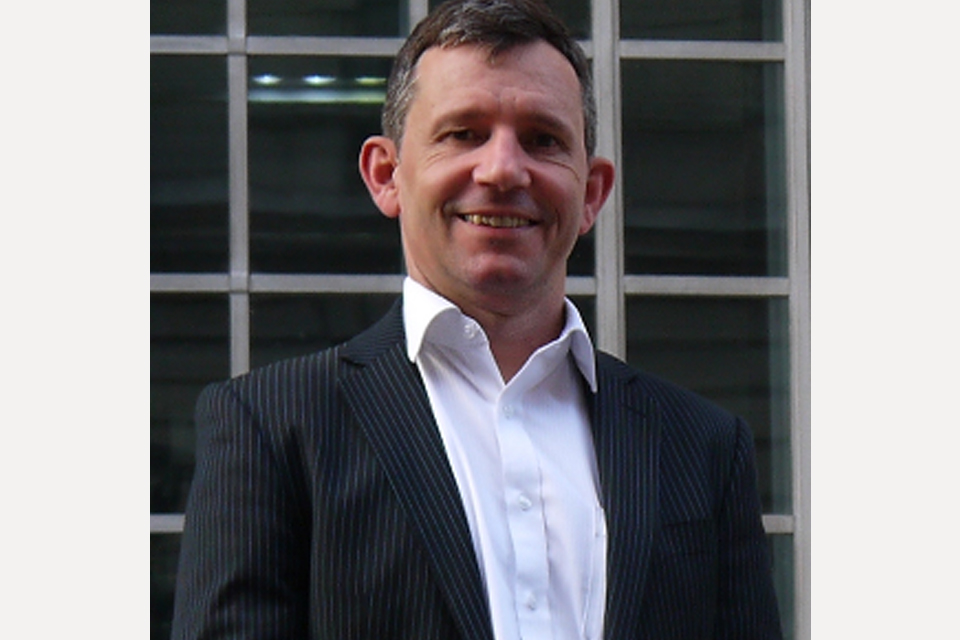
Name – Alec Waterhouse
Department – Business Energy and Industrial Strategy
Grade – SCS 1
Job Title – Head of Central Modelling
Profession (if a member) – Operational Research
When did you join the Civil Service and what was your job?
I joined the Civil Service in 2000 as a manager in the Operational Research group of the Department of Trade and Industry
What do you do in your current role and when did you move into this? What inspired you to move into the role?
I moved into my current role in 2013. I am responsible for:
- developing and using models to understand energy and emissions in the medium and long term
- producing and publishing energy and emissions projections
- understanding and developing insights into long term emissions reductions
- development and maintenance of the National Household Model – a domestic energy simulation
- developing and using approaches modelling and decision support
- departmental quality assurance policy for analytical models
- joint head of profession for the Operational Research Profession with responsibility for professional development
Before that I had spent four years in HMRC in more operational roles working on data integrity and data security for personal taxes and leading their performance measurement programme.
After a few years in these roles I felt that we were doing more of the same, important but covering similar ground, so I joined the Department of Energy and Climate change to work on probably the most important issue of our time decarbonisation.
What do you enjoy about your role?
I enjoy working with a high quality group of analysts and customers who ask questions that are useful but difficult to answer. I am lucky to be able to work on a wide range of analytical projects. I also really enjoy the work I do with the Operational Research Profession on professional development. Truly no two days are the same for me.
What are you proud of about yourself or your role or department?
I was proud to be part of the team that provided the supporting analysis underpinning our nation’s decision to change our decarbonisation target to net-zero by 2050.
If someone was looking to work in your area, what advice would you give them? What skills do you think they need?
If someone wanted to be a good operational researcher then it helps to be numerate, logical, curious, customer oriented and willing to learn new things. Operational research is a very broad field there is always something new to learn and always a way to use it to help clients. The trick is finding out what clients want and what you can do!
Anita Morrison and Nicola Edge (Scottish Government)
Name – Anita Morrison and Nicola Edge
Department – Scottish Government
Grade – SCS 1
Job Title – Deputy Director, Heads of Justice Analytical Services (JAS), Scottish Government
Profession (if a member) – Social Researchers
When did you join the Civil Service and what was your job?
Anita: I undertook a short term secondment to the Scottish Government in 1999, but then became a permanent employee in 2001. I initially worked in the Social Justice Research Team setting up People’s Panels and Juries for the Social Inclusion Partnerships in Scotland in 1999 and joined the Drugs Research Team (more aligned to my previous experience) in 2001.
Nicola: I joined the Scottish Government as a B3 Social Researcher in 1998 following research roles in local government and academia. My first role was working in the Social Inclusion Regeneration and Planning Team. This included developing the evidence base for the Scottish Government’s first Strategy for Social Justice.
What do you do in your current role and when did you move into this? What inspired you to move into the role?
Anita: Nicola and I currently share the Head of Justice Analysis role in the Scottish Government. It has been a fantastic opportunity to work with over 30 analysts from 4 professions in meeting the analytical needs of Ministers and policy colleagues across policing, courts, prisons and related issues.
Nicola: Anita and I wanted to bring our leadership values and experience to what is a genuinely cross-professional and collaborative role, to enhance the impact of analysis, drive improvement and change and make Justice Analysis a really great place to work for everyone.
What do you enjoy about your role?
Anita: Everything, but in particular advocating for and explaining for my colleague’s high quality analysis and seeing that have an impact or influence on people’s thinking. I also really enjoy coaching and developing analysts who are earlier in their careers.
Nicola: I love working with a team of great people with fantastic skills and ideas and having those kinds of conversations that lead to innovation and improvement. I really enjoy working with a great set of policy colleagues who really engage with evidence and analysis and value the role and contribution analysts can make to policy making and delivery.
What are you proud of about yourself or your role or department?
Anita: The high levels of motivation commitment and enthusiasm JAS analysts have for their work and their roles. Hopefully Nicola and I are instrumental in creating the right working environment for that. We get some really positive feedback about what a great place JAS is to work and that makes me feel happy and proud.
If someone was looking to work in your area, what advice would you give them? What skills do you think they need?
It’s a mix of the technical and people skills. It’s really important that we do technically sound work, but also that we can foster the relationships to share it and have influence. We look for those ‘softer’ skills around working well together, listening to others and being open to ideas and change, being willing to look across boundaries and make connections.
Jason Bradbury(Ofsted)
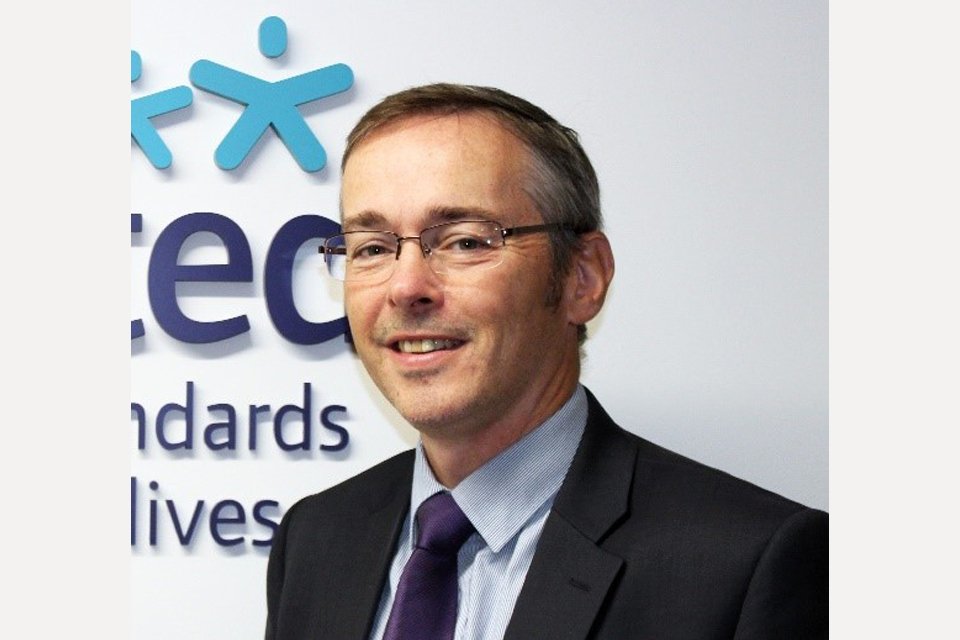
Name – Jason Bradbury
Department – Ofsted
Grade – Senior Civil Service
Job Title – Deputy Director, Data and Insight
Profession (if a member) – Statistics and Project Delivery
When did you join the Civil Service and what was your job?
I joined the Civil Service Fast Stream back in June of 1994. In my first job (which was in the Department for Transport, Marsham Street, London) I was responsible for setting up a European pilot survey into Transport Services (road haulage etc) working in collaboration with the Central Statistical Office (now Office for National Statistics). From there I moved on to the Department of Social Security (now DWP) in Newcastle for 6 years, working in a range of really interesting roles before then moving to the Ministry of Defence (again in a range of roles) in 2001.
In 2010 I became the head of Government Statistical Service Strategy within the National Statistician’s office before moving into the Office for National Statistics to work in Economic Statistics and then Programme leadership roles. In 2018 I moved into my current organisation, Ofsted.
What do you do in your current role and when did you move into this? What inspired you to move into the role?
In my current role I am the organisation’s Chief Statistician and Head of Profession for Statistics. With my team of around 100 brilliant analysts we provide a range of analysis and support services to Ofsted’s Inspection and Regulatory activity. I’m extremely proud of the fact we really do use real statistics and some very advanced statistical, data science and analysis techniques to help target our activity in areas that really make a difference.
In terms of what inspired me to move into the role, well, I’d been leading a major change programme for about four years and really wanted a change back into an operationally focused area. The job at Ofsted came up and the rest, as they say, is history.
What do you enjoy about your role?
The fact that what we do really, really matters every day to real people. Don’t get me wrong, central strategic and programme leadership roles also really matter, but (as part of any career) moving between those sorts of strategic, operational and delivery roles at periodic intervals is good for the soul and incredibly rewarding.
What are you proud of about yourself or your role or department?
I’m proud of myself for periodically going through the learning curve of moving departments, learning new cultures and meeting new people. It’s not always easy, but we pick up so much good practice from just experiencing different organisations and working with a diverse range of great people across government.
I’m very proud of my team for their ability to flex and adapt around changing priorities and for using data really well to provide a sound evidence base for Ofsted’s work. We’re not just at the policy table, we’re also out there supporting inspection and regulatory visits. There’s been some amazing stories of work we’ve done – such as on pupil exclusions – that has had a real and lasting effect on individual children and learners, just by changing perceptions and behaviours.
If someone was looking to work in your area, what advice would you give them? What skills do you think they need?
Come and talk to us and have a passion for good evidence, analysis and story-telling.
Getting messages out there and really making a difference only really happens if we’re able to engage our users. So, skills wise, good analysis skills (obviously), great people skills (to work with users and stakeholders) and the ability to bring data to life really matter. That’s the core set really.
If you also happen to have some good agile working experience or project management skills then that’s a real bonus, but diversity of skills, background and experience is so important, so if in doubt just pick up the virtual phone or come and visit!
Vanna Aldin (Food Standards Agency)

Name – Vanna Aldin
Department – Food Standards Agency
Grade – Grade 6
Job Title – Head of Analytics, Chief Economist
Profession (if a member) – GES
When did you join the Civil Service and what was your job?
I joined the Civil service in 2001 though an external recruitment from the Office for National Statistics. I joined as a researcher (HEO) and subsequently I joined the GES Fast Stream in 2004.
What do you do in your current role and when did you move into this? What inspired you to move into the role?
I joined the Food Standards Agency (FSA) in 2015 after more than seven year working on immigration policy at the Home Office. I lead a multi-disciplinary team of approx. 30 analysts (economists, operational researchers, statisticians and social researchers) including research fellows from leading universities. FSA is a small non-ministerial department with a big task: to protect consumers interest in relation to food and ensure food is safe and what it says it is.
My team provides an important role in ensuring policy is based on sound, timely and independent analysis and research. The clear objectives, the dedicated people I work with in every part of FSA, the impact we have on every day life of all citizens in the country are a really inspiration for me.
What do you enjoy about your role?
I really enjoy working with a very diverse team and the opportunity of applying a multi-disciplinary approach so that policy and operational colleagues can access the right skills and expertise. I enjoy the autonomy and independency that allows me to access external expertise in academia and in the research world through several channels including sponsoring PHDs and research fellowships.
What are you proud of about yourself or your role or department?
I am very proud to have raised the profile and impacts on analytical work here at FSA. The various initiatives I introduced and nurtured since I joined back in 2015 have had a real impact in ensuring policy and operational delivery decisions are based in high quality evidence and analysis, often ground-breaking.
If someone was looking to work in your area, what advice would you give them? What skills do you think they need?
I would advise: be open to learning, a necessary skill throughout our life, to engage with other disciplines outside your own expertise, embrace data science. In a very near future all analysts will need the skills to analyse and exploit the new frontiers of big data.
Jonathan Tecwyn (Department for Education)
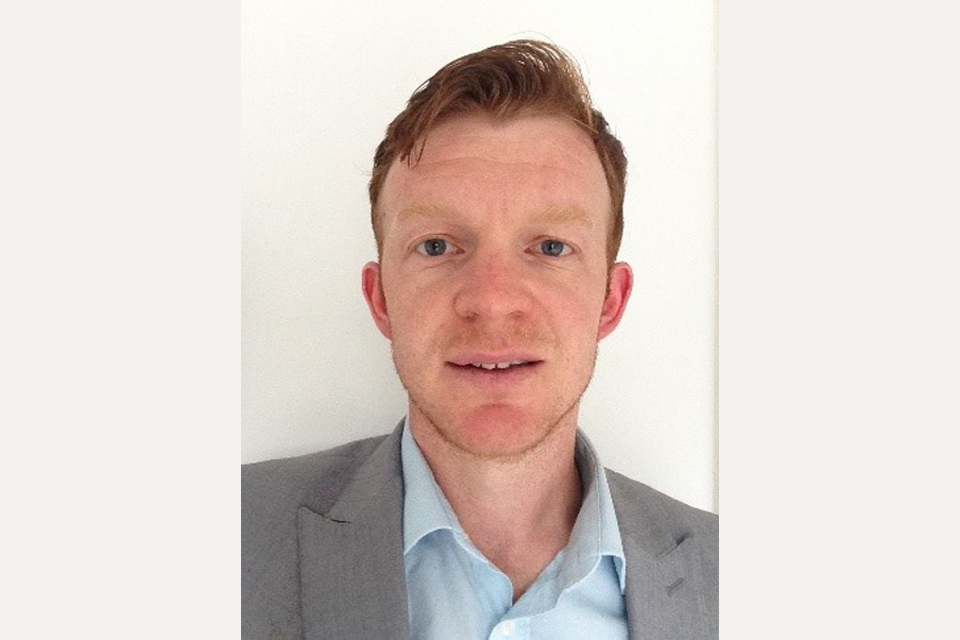
Name – Jonathan Tecwyn
Department – Department for Education
Grade – Grade 7
Job Title – Revenue Forecasting and Cost Pressures Team Lead
Profession (if a member) – GORS
When did you join the Civil Service and what was your job?
Way back in September 2009 I joined the Home Office in the (almost brand new) 2 Marsham Street building. I worked on a systems thinking / systems dynamics project looking at how the different parts of Home Office business interact (e.g. migration, courts, crime, policing… etc). This was shortly after the Home Office had been declared by new Secretary of State John Reid as “not fit for purpose” due to issues with (not) accounting for thousands of Foreign National Prisoners. This prompted the birth of a systems project to better join things up.
It was an interesting role in which I learnt how to do system dynamics, use soft systems techniques, and understand a bit more about a big and complex department. We struggled for traction though as time went on as it was difficult to build such a complex model with so many data mismatches etc. So I moved onto working on Police Pay and Conditions.
What do you do in your current role and when did you move into this? What inspired you to move into the role?
I started in DfE in June 2017, and enjoy my role so much that I have had the same job since then. I was attracted to the department due to the importance of the cause (I have second-hand experience being married to a teacher) and its high priority nature. I manage a very skilled team who forecast how much cash we need for different parts of the school system (we directly forecast around £10bn p/a).
We deliver big-scale, planned model updates as well as providing quick-turnaround analysis for policy development. Our priorities vary from preparing for spending review and business planning analysis to analysing the real cost pressures that schools face. We also work on teacher pay/pensions grants. We do most of our work in Excel, R and SQL.
What do you enjoy about your role?
Lots! There’s a great variety with:
- types of work (ranging from the “rough-and-ready” analysis to the 6-month projects),
- areas of schools policy we cut across (from free school meals to teacher pensions), and
- a breadth of talented and diverse colleagues we get to work with.
I feel that the work we do is (by and large) really important in policy development.
What are you proud of about yourself or your role or department?
I am proud of many things we do in DfE. Firstly, I think we are a department that genuinely champions diversity and recognises difference. Secondly, I think we’re a very forward-looking department in terms of ways of working (Skype, MS Teams etc) and the technologies we have across the analytical community (e.g. remote desktops, access to loads of great software). Thirdly, I love the geographical diversity – part of the pull of DfE was that it would allow me to move out of London (which I did in July 2019 having lived in London for 10yrs). Fourthly, I feel the department has a very supportive analytical community – I can reach out on Teams or Slack and will almost certainly receive a barrage of helpful suggestions.
Finally, I genuinely feel that corporate activities are encouraged and recognised across DfE, as are learning and development opportunities (I’m currently studying a part time MSc which I have been well supported with).
If someone was looking to work in your area, what advice would you give them? What skills do you think they need?
- The ability to build and maintain strong working relationships with the customers of your work – as well as looking to see how you can reach further to make a broader impact.
- The ability to grasp challenging/technical concepts and explain these to diverse audiences.
- Technical skills – in particular, SQL, R and Excel, as well as the ability to conduct uncertainty analysis (and explain it!)
- A desire to improve, and to both learn from and help to develop others.
Leanne Sunter (Department for Education)
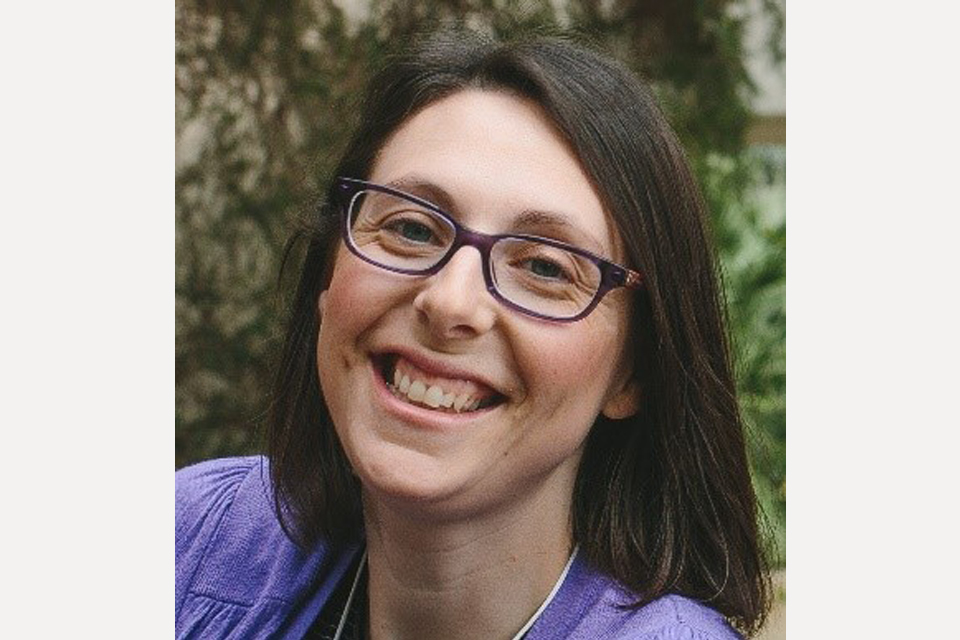
Name – Leanne Sunter
Department – Department for Education
Grade – Grade 7
Job Title – Strategic Financial Analysis Team Lead
Profession (if a member) – GORS
When did you join the Civil Service and what was your job?
I joined the Civil Service in 2008 as a Scientific Officer, working for Jobcentre Plus (JCP) within DWP. My first role involved producing a weekly dashboard for the Chief Operating Officer on various metrics of JCP performance during the recession. I quickly developed a wide range of contacts from across the Department and enjoyed the fast-paced nature of the work and the regular shifts in focus to ensure that JCP was operating as efficiently as possible.
Whilst at DWP I led on a number of other projects and using the coding skills I developed there saved around £50m a year by deploying operational staff more efficiently as well as working as part of a team of ORs to implement a room booking system that was so popular it was launched across a number of buildings.
What do you do in your current role and when did you move into this? What inspired you to move into the role?
I moved to my current role in DfE in January 2019, after almost 8 years in forecasting and modelling funding formulae for schools and high needs pupils. I was ready for a new challenge and relished the opportunity to gain some experience in a new area. In my new role, I take a much wider view of funding across the whole of DfE and support Strategic Finance with Spending Review work, looking at the bigger picture and being involved in the (sometimes difficult) trade-offs between areas within the Department.
This is a big contrast from my previous role where I knew lots of detail about a few policy areas but I really enjoy being able to use my existing knowledge and learn new things in my new post.
What do you enjoy about your role?
At the moment I’m really enjoying being able to support, nurture and develop my team members. Seeing them gaining confidence and skills and autonomy is really rewarding and when we deliver as a team and help to ensure evidence is at the heart of our decision making process I feel like we’ve done a great job.
What are you proud of about yourself or your role or department?
I am really proud of managing and leading a team of different professions across 3 different sites on a part-time basis and that I led on one of the biggest reforms to school funding in recent years as a part-time worker. DfE is really flexible and supportive of different working patterns which enables me to work from home and maintain a good work-life balance.
If someone was looking to work in your area, what advice would you give them? What skills do you think they need?
- Willingness to learn and develop your knowledge and skills
- Communicating difficult concepts in simple ways
- Breaking down complex problems into achievable tasks
- Providing the answer to someone’s question – even if they don’t know what that question is or it’s not the question they asked
David Wood (Defra)
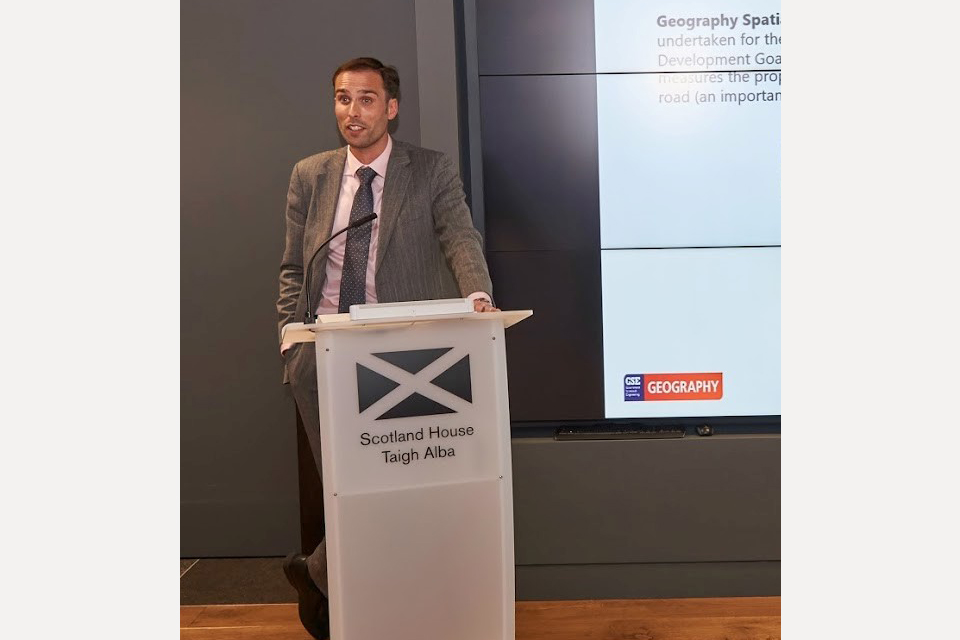
Name – David Wood
Department – Defra
Grade – Deputy Director
Job Title – Analysis and Performance
Profession (if a member) – Geography (part of GSE) and GES
When did you join the Civil Service and what was your job?
I joined the civil service in 1999 as a Faststream economist working in what is now the Ministry of Housing, Communities and Local Government on local government finance. I have gone on to work in 6 different Government departments, principally as an analyst, but also spending time in a policy role and a delivery role.
What do you do in your current role and when did you move into this? What inspired you to move into the role?
In addition to my day job, I am also the fi cross-government head of the geography profession, a new, growing and thriving profession which already has over 1,000 members across the public sector and is part of GSE and the Government Analytical Function. Everything happens somewhere, so it is crucial for government to understanding the impact of place on the design and delivery of public services and to have a profession which both supports its members and also champions the importance of spatial thinking across government.
My day job is at the Department for the Environment, Food and Rural Affairs. I joined (well, technically, re-joined after a 14 year gap…) Defra at the end of 2019 as the Deputy Director for the Environment Analysis Unit where I lead a multi-disciplinary team of around 30 specialists in environmental science, economics, spatial analysis, social research and statistics. The Unit provides joined-up analytical advice on environmental issues across Defra’s remit and generates the tools, data, and evidence needed to enable people to take account of the value of nature in decisions, plans and strategies that they make. I also head up the Defra Group Data Science Centre of Excellence, bringing together, supporting and promoting data science across the group.
What are you proud of about yourself or your role or department?
As head of geography I am really proud of the work our 900 members are doing across government to support policy design and delivery. It was an honour to formally recognise this for the first time this year with the Geography in Government awards, with the main award presented at the annual Royal Geography Society awards evening. It was amazing to see the reaction and interest in the work of government geographers at the RGS awards evening as, so often, much of what we do in Government is not visible to wider professional communities.
I am very proud of the fact that within HMCTS we have built a truly multi-disciplinary team of analysts so that we can draw off a diverse range of experiences and backgrounds to best support the business with robust and insightful management information and analysis, including having members of 6 of the 7 professions in the Government Analytical Function.
If someone was looking to work in your area, what advice would you give them? What skills do you think they need?
Everything happens somewhere. Now, more than ever, geographers are combining increasing quantities of geospatial information with advances in technology to drive new insights on our place in the world. We are leading the way in government and the public sector, recognising the importance of Geography, and we have established a profession to support our members in their work across the public sector.
The geography profession is quick and easy to join (join here http://bit.ly/GiG_Join, enter geography at question 11) and is open to all civil, crown and public servants.
Not all of us fit neatly into one box, so you can join the geography profession even if you are a member of another profession, as a lot of us with geo backgrounds or on-the-job learnt geo skills apply them across different disciplines (I’m an economic geographer by training, so am also a member of the Government Economic Service).
In our regular updates to our members we highlight jobs and opportunities, so if you have a background and passion for geography, join the profession and see what opportunities are out there!
Mujahid Rahman (Department Government Actuary’s Department (GAD))

Name – Mujahid Rahman
Department – Department Government Actuary’s Department (GAD)
Grade – Analyst Band 2
When did you join the Civil Service and what was your job?
I joined the Government Actuary’s Department in September 2016, straight after graduating from university. I’m currently an Analyst Band 2 in the Actuarial Services Team (AST). This is the central team responsible for the core technical calculations within GAD.
What do you do in your current role and when did you move into this? What inspired you to move into the role?
My current role is to provide support to actuaries in the production of advice and assurance to clients. In AST, I’ve been working mostly on the public sector pension scheme valuations, seeing through the process from start to finish, including data processing, calculations and sensitivities. This involved learning and understanding all facets of how an actuarial valuation is performed as well as learning specific details of such schemes and regulations.
I’ve also taken the opportunity to lead on elements of the project myself, which I have found to be an interesting and fulfilling challenge.
A big attraction to starting a career at GAD and within the actuarial profession itself was that it provided me the opportunity to integrate the theory and analytical skills that I had learnt from university and apply these to real-world scenarios.
What do you enjoy about your role?
There are many enjoyable elements at GAD such as the work-life balance available and the social activities that are on offer. There are many activities that people can get involved in, such as backgammon, badminton, cricket, football tournaments and many more!
In AST, we are encouraged to continuously strive for self-improvement and collective team development. Because of the nature and variety of projects, we get to work with everyone in the large team we have. This means that we get to interact with many people day to day from differing backgrounds. As a team, we even have regular socials ranging from go-karting to ‘escape room’ challenges.
What are you proud of about yourself or your role or department?
Working as an analyst at GAD has allowed me to grow and refine my skillsets, enhancing both technical and soft skills. Where I’ve had the opportunity to lead projects, I’ve developed skills in project planning, management as well as delegation and training of others in the team.
I have also been involved in client team and management meetings communicating updates on projects. Although there were many challenges including volume of work, tight deadlines and finite resources, I am proud of how we turned around results ahead of schedule and within budget.
Also being top scorer in my debut season in GAD football isn’t bad either…
If someone was looking to work in your area, what advice would you give them? What skills do you think they need?
A career at GAD would be a perfect fit if you have a passion for problem solving and enjoy a technical challenge! My main advice would be to gain work experience early and to explore data science opportunities, as this is a growing area.
Thannima Shamoli (Department Government Actuary’s Department (GAD))

Name – Thannima Shamoli
Department – Department Government Actuary’s Department (GAD)
Grade – Junior Trainee Actuary
When did you join the Civil Service and what was your job?
I joined the Civil Service as an Actuarial Analyst a year ago and then became a Junior Trainee Actuary 8 months later.
What do you do in your current role and when did you move into this? What inspired you to move into the role?
My current role involves complex analysis of financial data of organisations in the public sector or those with a historic tie to public services. From this, I can model various future scenarios that help these organisations to make sound financial decisions.
As well as creating the models and carrying out the analysis, another crucial element of the role is communicating the results to the client effectively which involves making decisions on how best to present data and what explanatory comments are required. It was the combination of using my mathematical skills, working to communicate complex information, and having an impact on public life that attracted me to the role.
What do you enjoy about your role?
Working with public sector clients means that my work has a real-life impact, and this makes my work both rewarding and exciting. It also presents unique challenges that require creativity to develop bespoke solutions that meet their specific needs. The work can also be fast-evolving and as a direct result of changes in laws and regulations.
What are you proud of about yourself or your role or department?
It is a real proud moment to see figures you have helped to produce appear in places such as ministerial statements. There is also a genuine collaborative spirit in the department which means that whatever level you are, your contribution is encouraged and valued. This also creates a friendly and fun atmosphere with plenty of socials to meet everyone’s interests.
If someone was looking to work in your area, what advice would you give them? What skills do you think they need?
To work in this area, you need to be comfortable working with figures and enjoy spotting patterns in, and then analysing, data.
You should also be an effective communicator and have a good attention to detail as it’s important that the work produced is accurate. The role relies heavily on use of Excel and programming languages that you can learn on the job, so it is worthwhile finding out if you like working with these programs.
